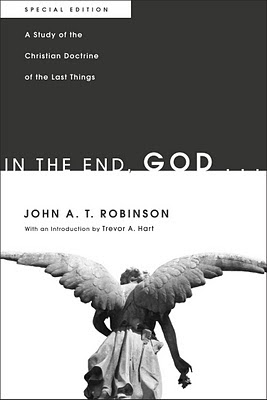"In the End, God..." New special edition coming (very) soon

Cascade books are publishing a new special edition of John A. T. Robinson's little book, In the End, God . . . (first published in 1950; 2nd ed. 1968). This book has been very hard to get hold of for a long time (it was a fair few second hand book shops I had to hunt around in before I found a copy). Bringing it back has been one of my pet projects over the past few months. Now it is here looking more snazzy than ever.
Here are the details:
John A. T. Robinson, In the End, God . . .: A Study of the Christian Doctrine of the Last Things. Special Edition
Eugene, OR: Cascade, 2011
ISBN: 978-1-60899-983-5
RRP: $23
Here is the back cover blurb:
“Eschatology is the explication of what must be true of the end, both of history and of the individual, if God is to be the God of the biblical faith. All eschatological statements can finally be reduced to, and their validity tested by, sentences beginning: ‘In the end, God . . .’”
J. A. T. Robinson
The God revealed in Israel’s story is the Lord of history—a God with good purposes for his creation and a God capable of bringing those purposes to pass. All biblical eschatology arises from this fundamental theological insight. If God is this God then what shape must the future have?
John A. T. Robinson explores biblical eschatology with an eye both to the text and to contemporary culture. Revealing the foundation of eschatology to be the experience of God by the community of faith, he calls readers to embrace the eschatological vision of the Bible, but to do so in a way that is alert to its mythic character.
In the course of these explorations Robinson also lays bare his own theology of universal salvation. But, contrary to what one may expect, this universalism is one that seeks to take both human freedom and the reality of hell with the utmost seriousness.
This special edition of John A. T. Robinson’s classic text also includes a debate between Robinson and Thomas F. Torrance (played out across three articles from the Scottish Journal of Theology in 1949), an extended introduction by Professor Trevor Hart (University of St Andrews, Scotland), and a foreword by Gregory MacDonald (author of The Evangelical Universalist).
"Of all Bishop Robinson’s writings, few, if any, are more enduring and timely than this clear articulation of the contours and christo-logic of soteriological universalism. A very fine introduction and profitable appendices also help to clarify what Robinson was, and was not, championing."
Jason Goroncy, Lecturer and Dean of Studies, Knox Centre for Ministry and Leadership, New Zealand
"A stimulating theological reading of Scripture that puts the doctrine of God at the heart of eschatology. Robinson's little classic, whilst not without its faults, still deserves serious consideration."
Gregory MacDonald, author of The Evangelical Universalist
John A. T. Robinson was a New Testament scholar who served as Bishop of Woolwich, England, and as Dean of Trinity College, Cambridge.
I don't agree with all Robinson's views (you'll be relieved to know) but I have read this book six or seven times and every time I find it thought-provoking and stimulating.

Comments
I especially learned a lot from the last three chapters -- they were great!
re the debate between JAT and TF, it wasn't easy to follow.
Any chance you could summerize it for us -- or must we buy the book?
JATR replies, "No I don't."
Obviously it is more involved by that (and Trevor Hart's intro surveys the debate and makes some assessments of the arguments used).
Got me interested -- now I'm wanting to read Trevor Harts comments!
I've heard it explained that the so called liberal wing of Church has stopped talking about hell, and in the process, has stopped talking about heaven too.
(((On the other hand, the so called conservative wing (hate these labels!) has tried to continue with a perceived "orthodoxy". They tried to continue with "everlasting" punishment for their doctrine of hell, but have suffered detractors who have opted for annihilationism. And now there are even "evangelical" universalists! ;)))
Back to the liberals: am I right in thinking that JAT Robinson, even back in 1950, was trying to get the liberals to take eschatology more seriously? He seemed to me to be saying, unless you have worked out the eschatology, you (liberals?) have a truncated Gospel.
ps at the moment, I've got Hanson's Aion/Aionios book out from Edinburgh NC Library, and guess what the old library sticker in the book says:
New College Library, Edinburgh
DEPARTMENT
OF
ESCHATOLOGY
Those were the days!!